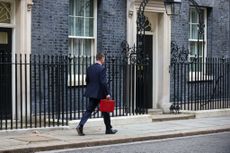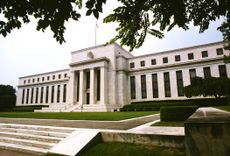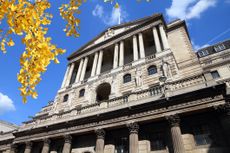Inflation is the easiest way out of this – just don’t expect politicians to admit it
The UK government borrowed £34.1bn in December, a record amount for that month. Britain's debt pile now amounts to 100% of GDP. How are we going to pay it all back? Realistically speaking, says John Stepek, there is only one way: inflation.


There is no “magic money tree”. Apparently, that’s what chancellor Rishi Sunak is telling his colleagues in the Conservative party.
That’s not strictly true. Sunak has already given the money tree a rather vigorous shake in his efforts to contain the economic fallout from lockdown.
However, Sunak also understands something else: the first rule about magic money trees is that you don’t talk about magic money trees.
Subscribe to MoneyWeek
Subscribe to MoneyWeek today and get your first six magazine issues absolutely FREE

Sign up to Money Morning
Don't miss the latest investment and personal finances news, market analysis, plus money-saving tips with our free twice-daily newsletter
Don't miss the latest investment and personal finances news, market analysis, plus money-saving tips with our free twice-daily newsletter
How does a government pay back debt? Through default, inflation, or growth
The UK government borrowed another £34.1bn in December. Ever since the 2008 financial crisis, a billion has seemed like a far smaller number than it once was. I mean, we’ve just had Joe Biden talking about a $1.9trn stimulus for the US economy. So is £34bn a big number?
Well, in this context, yes – it is rather a big number. It’s the highest amount the UK government has ever borrowed in a December (monthly records only began in 1993 but I think we can safely assume that “ever” is the right word here). It also drives our debt-to-GDP ratio to nearly 100%. That’s the highest it’s been since the early 1960s (and at that point, it was on the way down, not up).
None of this should come as a huge surprise. The government is currently paying a lot of wages, parts of the economy are entirely shut down, tax receipts have been pushed back in some cases – we really are in a unique situation.
Now we’re even looking at giving people £500 as an incentive to self-isolate if they get a positive Covid-19 result (there’s absolutely no room for that to be abused, I’m sure you’ll all agree).
Of course, all of this raises the question: how do we pay this back? This isn’t a hard question to answer. There are really three ways to deal with debt. You can just tear it up. This is a route that quite a few nations have gone down in the past, many of them more than once. It doesn’t do much for your economic credibility, though as Argentina’s regular defaults and market comebacks demonstrate, hope does spring eternal in the heart of bond investors.
Another route is to pay it back with “real” money. Under this method, your economy grows more rapidly than the interest on the debt, and you are able to pay it off via actual productive growth. This is how you or I need to repay our debts.
Another method – one that’s not open to you or me (though we can still benefit from it), but that is open to a government – is to repay the debt by inflating it away. If inflation is higher than the interest on the debt, then in effect, you’re paying the debt back with devalued money. It’s a little bit like a default without it actually being a default.
So the answer is easy. The tricky bit is in the execution.
Inflation is the easiest way out of this – just don’t expect politicians to admit it
Bond investors aren’t stupid (in fact, they’re generally viewed as being smarter than equity investors). If they think a government is planning to go for option 3 – the inflation route – then they will try to get ahead of them by charging higher interest rates on debt. That’s where the notion of the so-called “bond vigilantes” came from.
Some argue that the bond vigilantes have been given a sound thrashing in recent years. That’s because central banks have been printing money and trying to spark inflation for ages. Nothing has happened; yields on bonds across the world have continued to fall. Indeed, bond investors are apparently largely accepting negative real (after inflation) returns, and in some cases, even negative nominal returns.
Hence, the pro-money-printing lobby argue, there are no bond vigilantes left. Indeed, bond markets are now mostly willing to accept negative returns in both real (after-inflation) and sometimes nominal terms.
It’s more complicated than that; bond yields have been held down for all sorts of reasons (buyers with infinite potential buying power in the form of central banks, plus regulations forcing financial institutions to hold more of them, are just a couple). But the other big driver is that investors have broadly agreed that we’re in a disinflationary environment and that whatever central banks do, it won’t spark inflation.
Also, it’s a massive momentum trade. Falling yields mean rising bond prices. We often talk about bond investors as if they’re just going to buy and hold. But bonds are tradeable, just like stocks. You may not care about the yield if you think the price is going to keep going up – buy it today at one price, sell it tomorrow at a higher price, and it doesn’t matter if the “real” yield is negative or not.
If bond investors stop believing that inflation is under control, or start to believe that the trend is no longer lower, then keeping bond yields down is going to be a lot trickier. That’s not to say it’ll be impossible. Central banks do have infinite printing power, so they can artificially keep yields as low as they like. However, the risk then is that this comes out in the currency market.
Again, that can be controlled too. If every central bank in the world is printing money, then ditching one currency for another is not especially appealing. However, a country like the UK needs to be careful. If it looks like we’re the only ones going down the modern monetary theory/magic money tree route, or if we’re a bit ahead of everyone else, then we could find ourselves being buffeted by markets rather more than say, the US would be in the same situation.
So, to sum up, our chancellor – and our central bankers – have to talk a good game. Hence all the slightly stern suggestions from Sunak that there is no free lunch, and that taxes will be raised in the March budget to pay for all of this.
The truth is that inflation is the easiest way out of this mess, and it’s the desired goal for every government out there. It will create winners and losers – every policy does. And it’s unfairer to some people than others – every policy is. But it’s the least politically painful method, which is why it’s the one that will be pursued. Just don’t expect any politician to admit that in public.
Of course, if you have savings, then you risk being one of the losers from this policy. If you don’t already read MoneyWeek, then subscribe now. We’ll be writing an awful lot more about how to protect your money in an era of financial repression. Get your first six issues free here.
John is the executive editor of MoneyWeek and writes our daily investment email, Money Morning. John graduated from Strathclyde University with a degree in psychology in 1996 and has always been fascinated by the gap between the way the market works in theory and the way it works in practice, and by how our deep-rooted instincts work against our best interests as investors.
He started out in journalism by writing articles about the specific business challenges facing family firms. In 2003, he took a job on the finance desk of Teletext, where he spent two years covering the markets and breaking financial news. John joined MoneyWeek in 2005.
His work has been published in Families in Business, Shares magazine, Spear's Magazine, The Sunday Times, and The Spectator among others. He has also appeared as an expert commentator on BBC Radio 4's Today programme, BBC Radio Scotland, Newsnight, Daily Politics and Bloomberg. His first book, on contrarian investing, The Sceptical Investor, was released in March 2019. You can follow John on Twitter at @john_stepek.
-
 Coventry Building Society bids £780m for Co-operative Bank - what could it mean for customers?
Coventry Building Society bids £780m for Co-operative Bank - what could it mean for customers?Coventry Building Society has put in an offer of £780 million to buy Co-operative Bank. When will the potential deal happen and what could it mean for customers?
By Vaishali Varu Published
-
 Review: Three magnificent Beachcomber resorts in Mauritius
Review: Three magnificent Beachcomber resorts in MauritiusMoneyWeek Travel Ruth Emery explores the Indian Ocean island from Beachcomber resorts Shandrani, Trou aux Biches and Paradis
By Ruth Emery Published
-
 UK wages grow at a record pace
UK wages grow at a record paceThe latest UK wages data will add pressure on the BoE to push interest rates even higher.
By Nicole García Mérida Published
-
 Trapped in a time of zombie government
Trapped in a time of zombie governmentIt’s not just companies that are eking out an existence, says Max King. The state is in the twilight zone too.
By Max King Published
-
 America is in deep denial over debt
America is in deep denial over debtThe downgrade in America’s credit rating was much criticised by the US government, says Alex Rankine. But was it a long time coming?
By Alex Rankine Published
-
 UK economy avoids stagnation with surprise growth
UK economy avoids stagnation with surprise growthGross domestic product increased by 0.2% in the second quarter and by 0.5% in June
By Pedro Gonçalves Published
-
 Bank of England raises interest rates to 5.25%
Bank of England raises interest rates to 5.25%The Bank has hiked rates from 5% to 5.25%, marking the 14th increase in a row. We explain what it means for savers and homeowners - and whether more rate rises are on the horizon
By Ruth Emery Published
-
 UK wage growth hits a record high
UK wage growth hits a record highStubborn inflation fuels wage growth, hitting a 20-year record high. But unemployment jumps
By Vaishali Varu Published
-
 UK inflation remains at 8.7% ‒ what it means for your money
UK inflation remains at 8.7% ‒ what it means for your moneyInflation was unmoved at 8.7% in the 12 months to May. What does this ‘sticky’ rate of inflation mean for your money?
By John Fitzsimons Published
-
 VICE bankruptcy: how did it happen?
VICE bankruptcy: how did it happen?Was the VICE bankruptcy inevitable? We look into how the once multibillion-dollar came crashing down.
By Jane Lewis Published